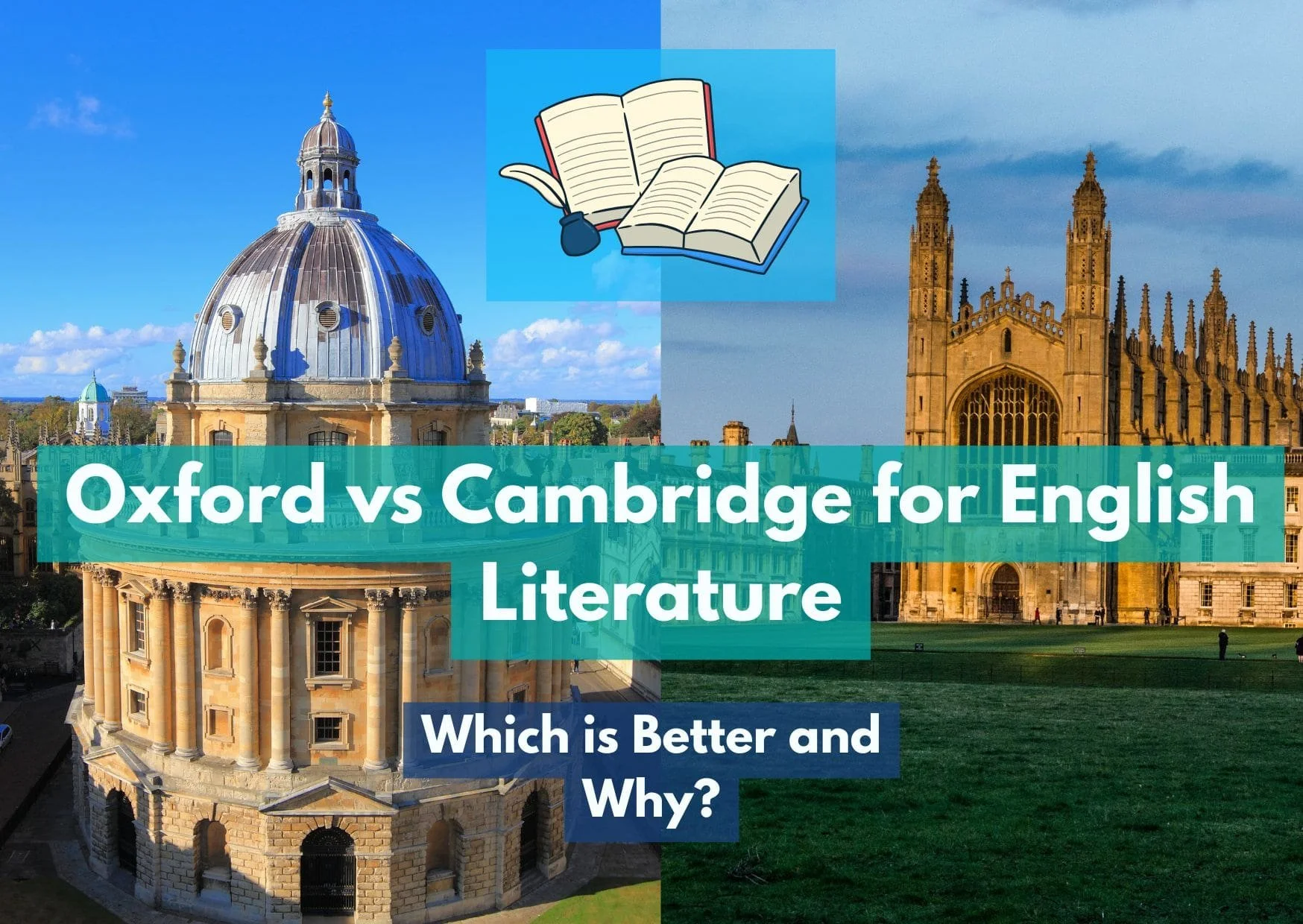Oxford vs Cambridge for English Literature: Which is Better and Why?
Blog Contents
What’s the difference between studying English Literature at Oxford and Cambridge?
Which has tougher admissions: Oxford or Cambridge for English Literature?
How different is the English Literature course at Oxford and Cambridge?
What are the differences in paper or module options between Oxford and Cambridge?
How are English students assessed at Oxford compared to Cambridge?
What kind of student fits better at Oxford vs Cambridge for English Literature?
Need help with your Oxford or Cambridge English application? Here’s how U2 Tuition can support you:
At U2 Tuition, we appreciate that choosing a degree and a university is not easy, especially when choosing between institutions as prestigious as Oxford and Cambridge. It’s the next three years of our life, and you want to get your next steps right; that’s why we’re here to support you in making your decision. This guide offers a clear, bite-sized comparison between admissions, course content, assessments and more.
Alongside this article, we offer one-to-one admissions mentoring to assist you in making the right decision for you and helping you secure your dream place on these highly competitive courses. We have tutors who attended both courses, including our co-founder Camille, who studied English at Oriel College, Oxford (and loved it!). Let us use our insider knowledge to help you navigate Oxbridge admissions! If interested, you can book a complimentary 20-minute consultation about your Oxbridge English Literature Application and how we can support here:
What’s the difference between studying English Literature at Oxford and Cambridge?
While Oxford and Cambridge are both world-class institutions, they are very different places, and their courses aren’t identical.
Oxford
Ranked 4th in the QS world rankings. For English, it is ranked joint 1st with Cambridge currently.
Oxford is a much bigger city than Cambridge, and its university is also slightly larger. This, some could say, cultivates a livelier vibe.
211 English Language and Literature undergraduates a year. It also has the largest English department in Britain.
Alongside lectures, teaching is done via tutorials, where a tutor and one or two students discuss a particular topic. These tend to focus on essay development and provide individualised guidance.
The course is focused on enabling students to develop a broad range of skills crucial to studying English, such as contextualising texts, critical analysis, evaluation of literary critical approaches, and understanding the development of the English language. Students study papers that work chronologically across literary eras, from Medieval Literature (e.g. Beowulf) through to Contemporary literature.
Cambridge
Ranked 6th in the QS world rankings. For English, it is ranked joint 1st with Oxford.
Cambridge is a smaller city; university-wise, it is dominated by the university more than Oxford. It has a more relaxed, quaint vibe.
182 English undergraduates a year.
Teaching occurs similarly to Oxford, though meetings are called supervisions. These are often slightly bigger than tutorials but are still very small group discussions focused on essay feedback, analytical skills, and a collaborative learning environment.
Alongside providing a foundation of the history of English literature, students are introduced to various writing formats and have many opportunities to specialise and develop their interests. There is greater focus on Practical Criticism at Cambridge than Oxford.
Which has tougher admissions: Oxford or Cambridge for English Literature?
The two universities are fairly evenly weighted regarding admissions acceptance rates, but their requirements and processes vary. Both have a UCAS deadline of the 15th of October.
Oxford
Written work submission
One sample of written work is required.
It must be submitted by early November.
It can be an analytical essay about English literature, a timed essay, a critical commentary, or an excerpt of other work.
It must be no more than 2,000 words and should not be written for this admissions process. It should be a piece of already completed school work, marked by a teacher.
Admissions tests - There is currently no Admissions test.
Interview formats
Evidence of wider reading, enthusiasm for literature, independent and critical thinking, and possibly unseen prose or verse are all likely to be examined.
They look for no particular readings or correct answers; they want to see how you engage with literature and your passion for the subject.
Typical offer grades
AAA at A-Level, AA/AAB at Advanced Highers, or 38 with 666 HL in IB.
Candidates must have English Literature or English Language as one of those subjects.
Acceptance rate
67% of applicants are interviewed, and 23% are successful.
Cambridge
Notably, application requirements vary more between colleges at Cambridge than at Oxford. Admissions are far less centralised, unless you apply for an open application, so it’s essential to familiarise yourself with the requirements for the college you wish to apply to.
Written work submission
Two pieces of written work are required for submission.
The college you have applied to will explain how to send them your work and the deadline.
In all cases, it should be work marked by your teacher; the college will specify further requirements.
Admissions tests
Admissions tests are required at all colleges.
The precise format and content of this vary by college.
Tests tend to be taken in November, but this is college-specific.
Interview formats
Interviews follow a similar format, again looking for evidence of your passion for English and how you think via your current knowledge and exposure to new or unfamiliar ideas.
Broad pre-reading, familiarity with content from your personal statement, submitted work, and exploring subjects that interest you beyond the curriculum are all invaluable preparations.
Typical offer grades
A*, A, A at A-Level, or 41-42 and 776 at Higher Level for IB.
Some colleges may make higher offers or specify an A* in a specific subject.
English Literature or the combined English Literature and Language A-Level are required (N.B. Corpus Christi and Queen’s College do not accept the combined A-Level).
Acceptance rate
There is one applicant for every four places. The success rate is similar to Oxford’s, although Cambridge tends to interview more students.
Further Information:
Check out the Oxford and Cambridge English Literature webpages.
Check out our blog about ‘Understanding the Oxbridge English Interview’
Purchase our Oxbridge English Interview Pack, which features tips from our co-founder’s experience with her English application to Oxford and other insights from our Oxbridge English tutors.
If you need practice, consider one of our Oxbridge mock interview days, held in November.
For more information about how we can help with the end-to-end applications process, book one of our complimentary 20-minute consultations here.
How different is the English Literature course at Oxford and Cambridge?
Is there a particular writer or period that piques your interest? Examining the differences in Oxbridge English courses is essential as they have different focuses and options. Your favourite topic, the root of your passion and enthusiasm to study English, may not be touched on in one course.
1st Year
Oxford
Four key modules are assessed at the end of the year, though the result does not count towards the final degree classification.
Introduction to English Language and Literature (N.B. this paper is assessed by a portfolio of essays, rather than a written assessment like the other three papers).
Early Medieval Literature (650-1350).
Literature in English 1830-1910).
Literature in English 1910-Present Day.
This year's focus is on introducing students to conceptual and technical tools relevant to studying English. It is structured by period.
Cambridge
1st year is referred to as Part IA. It consists of two compulsory papers.
Practical Criticism and Critical Practice. This is examined by an unseen exam whereby students apply practical criticism to poetry or prose.
Shakespeare. This paper is assessed through a portfolio of essays, typically submitted in the Easter Term.
Students also begin working on two ‘period papers’ examined in Year 2. There are 5 periods, varying in length, to choose between, encompassing 1066 to the present day.
2nd Year
Oxford
Students will decide whether to progress on Course I or II based on their interests. Each consists of four papers in the second year, examined at the end of the third year.
Course I focuses on literary periods from 1350-1830, with papers covering periods such as 1350-1830, and 1550-1660.
Course II is a specialist Medieval literature and language course. It focuses on earlier periods, such as 650-1100, and Medieval English and Related Literatures.
Cambridge
This year, ‘Part IB” consists of one compulsory paper and three further papers.
The compulsory paper is English Literature and its Contexts 1300-1550.
The other three papers can be chosen from a broader range of periods, such as Early Medieval Literature from 1066 to 1350 or English literature from a set period between 1500 and the Present.
As mentioned, work on 2 of these non-compulsory papers will have begun in the first year.
For one of their paper options, except Early Medieval Literature, students can replace it with a dissertation.
3rd Year
Oxford
Course I studies Shakespeare in the third year.
Course II studies either The Material Text or Shakespeare.
Students on both courses also complete a special options paper.
The topics for this vary each year but may include Old Norse, Postcolonial Literature, or the Archaeology of Anglo-Saxon England.
Finally, an 8,000-word dissertation in any English Language or Literature area is written.
Cambridge
The third year is called ‘Part II’ of the course.
There are two mandatory papers
Practical Criticism and Critical Practice II
Tragedy covers a wide range from ancient Greek drama to modern works.
Students submit a 6,000-7,500-word dissertation on an English topic of their choosing.
Students then take two other optional papers, or one optional paper, and a second dissertation.
Optional papers include ‘Chaucer’, ‘Postcolonial Literature’, and ‘Contemporary Writing’.
Some papers from Anglo-Saxon, Norse, and Celtic, Classics, or Modern and Medieval Languages are available.
Join Our English Literature ‘Beyond the Syllabus’ Oxbridge Summer School
Two Oxbridge English Literature hosts
Gain exposure to university level topics and methods of learning
Impressive ideas for your personal statement and interviews
Interactive Oxbridge-seminar-style sessions
What are the differences in paper or module options between Oxford and Cambridge?
Put simply, Cambridge offers greater flexibility and variety. The Oxford course is more structured.
Oxford papers focus on a chronological progression of literary periods.
Students can specialise through their dissertation and the Special Options Paper; beyond that, students can only really choose between courses I and II, with the vast majority opting for course I.
The focus is on traditional literary periods, rather than modern or interdisciplinary papers.
It is worth noting though that there is some opportunity to specialise/ explore individual interests e.g. students choose from a variety of fascinating modules for one of their Year 3 Papers (Camille chose postcolonial literature for example) and through coursework. Oxford is full of avant garde professors researching interesting and current areas that could relate to your passions.
Conversely, Cambridge offers a broader variety of optional papers and cross-disciplinary links.
There are fewer mandatory papers overall, so students have greater control over what they choose to study.
The optional papers are also more diverse, covering topics like ‘The Medieval Supernatural’, ‘Contemporary Writing’, and interdisciplinary topics like ‘Visual Culture’.
More modern modules are available earlier than in the Oxford course.
Students can also replace a small number of specific exams with coursework.
How are English students assessed at Oxford compared to Cambridge?
With its examination-heavy third year, Oxford is more intense than Cambridge, which enacts a more ongoing assessment format throughout the course.
Oxford focuses most of its assessments in the third year, with final exams forming the majority of students’ overall grades.
They submit an extended essay on their special subject at the end of their first term of 3rd year.
Their dissertation is submitted during the second term of 3rd year, as is their portfolio on Shakespeare or the Material Text.
In the 3rd term of their 3rd year, students sit their final four written exams, consisting of the course I or Course II papers they learnt in the second year.
Students submit essays, portfolios, and multiple dissertations throughout their studies at Cambridge, creating a more consistent evaluation.
What kind of student fits better at Oxford vs Cambridge for English Literature?
There is no right or wrong choice, no better or worse; instead, choose intentionally by thinking about what you value, where you would be happiest, and which course best resembles your interests. Alongside the courses, it’s important to consider differences in the university, city, and college. Remember, you aren’t just studying, you’re living in these cities.
Consider Oxford if you:
Are drawn to a more structured, chronological approach to literary study, emphasising distinct literary periods.
Thrive in exam-based environments and value the more centralised nature of teaching.
Enjoy deep dives and close readings into a specific period.
Feel at home in a busier, bustling city where the university isn’t the only part of local life, and the nightlife is slightly livelier.
Want a university with a greater emphasis on tradition, such as wearing sub fusc (a style of academic dress) for your exams.
Cambridge is more your style if you:
Value flexibility and want a broader range of optional papers, including greater modern and interdisciplinary topics.
Benefit more from continuous assessment throughout the course.
Favour the supervision style over tutorials and appreciate the greater independence colleges have.
Love the opportunity to engage in subjects beyond traditional literary periods, with an emphasis on theory.
Appreciate a smaller city that can feel quieter, where the university is the centre of life.
Need help with your Oxford or Cambridge English application? Here’s how U2 Tuition can support you:
Applications to English at Oxford or Cambridge are incredibly competitive, so the proper guidance can make all the difference to your application. U2 can help you stand out through our one-to-one application mentoring.
We offer end-to-end admissions support, delivered by graduates from your chosen course, university, and college (where possible). Support includes:
Help choosing a course, university, and college, if needed.
Advice on crafting a personal statement that demonstrates your passion and literary thinking.
Written work review. Though our mentors can’t help you write a new piece of work to submit, as this goes against both universities’ guidelines, they can help you choose which of your works to submit.
Assessment preparation, where relevant.
Mock interviews with practical feedback to help you familiarise yourself with the unfamiliar experience.
Whether at the beginning of your application journey, choosing between Oxford and Cambridge, or needing a last-minute mock interview, U2 Tuition provides bespoke, private support at every stage. Don’t hesitate to get in touch via a complimentary 20-minute consultation.






